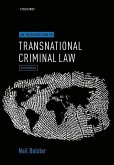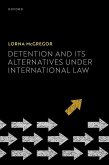Blackstone's International Criminal Practice
Herausgeber: Jones Qc, John R W D; Zgonec-Ro%zej, Misa
581,99 €
inkl. MwSt.
Versandkostenfrei*
Erscheint vorauss. 30. Juni 2028
Melden Sie sich
hier
hier
für den Produktalarm an, um über die Verfügbarkeit des Produkts informiert zu werden.

291 °P sammeln
Blackstone's International Criminal Practice
Herausgeber: Jones Qc, John R W D; Zgonec-Ro%zej, Misa
- Gebundenes Buch
The definitive practitioners' guide to international criminal law and practice, Blackstone's International Criminal Practice provides comprehensive coverage of all major international and internationalised criminal courts. The book's primary focus is the International Criminal Court but also covers war crimes tribunals and domestic practice.
Andere Kunden interessierten sich auch für
![Treatise on International Criminal Law Treatise on International Criminal Law]() Kai AmbosTreatise on International Criminal Law358,99 €
Kai AmbosTreatise on International Criminal Law358,99 €![An Introduction to Transnational Criminal Law An Introduction to Transnational Criminal Law]() Neil BoisterAn Introduction to Transnational Criminal Law228,99 €
Neil BoisterAn Introduction to Transnational Criminal Law228,99 €![Blackstone's Civil Practice 2022 Blackstone's Civil Practice 2022]() Blackstone's Civil Practice 2022337,99 €
Blackstone's Civil Practice 2022337,99 €![Detention and Its Alternatives Under International Law Detention and Its Alternatives Under International Law]() Lorna McGregorDetention and Its Alternatives Under International Law138,99 €
Lorna McGregorDetention and Its Alternatives Under International Law138,99 €![Blackstone's Civil Practice 2023 Blackstone's Civil Practice 2023]() Blackstone's Civil Practice 2023484,99 €
Blackstone's Civil Practice 2023484,99 €![The International Criminal Court The International Criminal Court]() William A SchabasThe International Criminal Court534,99 €
William A SchabasThe International Criminal Court534,99 €![Criminal Evidence Criminal Evidence]() Paul RobertsCriminal Evidence215,99 €
Paul RobertsCriminal Evidence215,99 €-
-
-
The definitive practitioners' guide to international criminal law and practice, Blackstone's International Criminal Practice provides comprehensive coverage of all major international and internationalised criminal courts. The book's primary focus is the International Criminal Court but also covers war crimes tribunals and domestic practice.
Hinweis: Dieser Artikel kann nur an eine deutsche Lieferadresse ausgeliefert werden.
Hinweis: Dieser Artikel kann nur an eine deutsche Lieferadresse ausgeliefert werden.
Produktdetails
- Produktdetails
- Verlag: Hurst & Co.
- Seitenzahl: 1750
- Erscheinungstermin: 30. Juni 2028
- Englisch
- ISBN-13: 9780198749332
- ISBN-10: 0198749333
- Artikelnr.: 47869197
- Herstellerkennzeichnung
- Libri GmbH
- Europaallee 1
- 36244 Bad Hersfeld
- gpsr@libri.de
- Verlag: Hurst & Co.
- Seitenzahl: 1750
- Erscheinungstermin: 30. Juni 2028
- Englisch
- ISBN-13: 9780198749332
- ISBN-10: 0198749333
- Artikelnr.: 47869197
- Herstellerkennzeichnung
- Libri GmbH
- Europaallee 1
- 36244 Bad Hersfeld
- gpsr@libri.de
John Jones QC is a barrister who has worked in international criminal law since 1995. He has represented accused/suspects before the International Criminal Tribunal for the former Yugoslavia (ICTY) (counsel in five cases), the International Criminal Court (Saif Gaddafi), the Special Court for Sierra Leone (SCSL) (Charles Taylor), the Cambodia Tribunal (ECCC) and the Special Tribunal for Lebanon. He has also worked for the Chambers and Registry of the ICTY and the International Criminal Tribunal for Rwanda (1995-1999). He was the first acting Principal Defender of the SCSL in 2003. In addition to international criminal law, John specialises in extradition, UN and EU sanctions and Interpol red notices. John is admitted to the Bars of England and Wales, Washington D.C. and Cambodia, and has been admitted to the bars of Gibraltar, Kigali and Kosovo for individual cases. Dr. Mia Zgonec-Ro%zej is currently an associate fellow in international law at Chatham House. She was formerly a legal advisor in the international justice team at Amnesty International, in the International Secretariat in London, legal officer in the Chambers of the International Criminal Tribunal for the former Yugoslavia, legal assistant to the former President of the International Court of Justice, Judge Shi, and the former Vice-President of the Court, Judge Al-Khasawneh, a lecturer at the Faculty of Law, University of Ljubljana in Slovenia and a teaching fellow at the School of Oriental and African Studies, University of London. She holds a PhD from the Faculty of Law, University of Ljubljana and an LL.M. from Columbia University School of Law, New York. She is also the author of several manuals on international criminal law and human rights. She regularly acts as a trainer and consultant on international law and human rights issues.
* PART A: SUBSTANTIVE LAW ON INTERNATIONAL CRIMES
* A1: Genocide
* A2: Crimes against humanity and requirement organisational policy
* A3: War crimes
* A4: The crime of aggression
* A5: Torture
* A6: Terrorism
* A7: Piracy
* A8: Slavery
* A9: Apartheid
* A10: Extrajudicial killings
* A11: Enforced disappearances
* A12: Crimes of sexual violence
* PART B: FORMS OF INDIVIDUAL CRIMINAL RESPONSIBILITY
* B1: Introduction
* B2: Inchoate crimes
* B3: Direct and indirect perpetration/commission/committing
* B4: Co-perpetration (Article 25(3)(a) of the ICC Statute)/joint
commission
* B5: Common purpose liability: joint criminal enterprise
* B6: Common purpose liability: liability under Article 25(3)(d) of the
ICC Statute
* B7: Planning
* B8: Instigating, ordering, soliciting, inducing
* B9: Aiding and abetting or otherwise assisting
* B10: Superior responsibility
* B11: The resolution of concurrent responsibilities: cumulative
charges, cumulative convictions
* PART C: GROUNDS FOR EXCLUDING CRIMINAL RESPONSIBILITY
* C1: Introduction
* C2: Amnesties, minority, non-applicability of status of limitations
* C3: Immunities/irrelevance of official capacity
* C4: Alibi, mistake of fact or mistake of law, consent
* C5: Defences: mental disease or defect, intoxication, necessity,
duress, superior orders
* C6: Defences: self-defence, defence of others
* C7: Non-statutory defences: belligerent reprisal, tu quoque, military
necessity
* PART D: INTERNATIONAL CRIMINAL COURTS AND TRIBUNALS
* D1: Early attempts, Nuremberg, Tokyo
* D2: ICTY
* D3: ICTR
* D4: MICT
* D5: The ICC
* D6: Mixed or Internationalised Criminal Courts of Tribunals: SCSL
* D7: Mixed or Internationalised Criminal Courts of Tribunals: ECCC
* D8: Mixed or Internationalised Criminal Courts of Tribunals: STL
* D9: East Timor: The Serious Crimes Panels
* PART E: INTERNATIONAL CRIMINAL PROCEEDINGS
* E1: Introduction
* E2: General principle of criminal law
* E3: Rights of the accused
* E4: Admissibility/jurisdiction
* E5: Law/rules of evidence
* E6: Evidence in cases of sexual assault
* E7: Production of evidence/disclosure
* E8: Investigation
* E9: Pre-trial
* E10: Trial phase: conduct of trial proceedings, structure of the
trial (opening statements, order of presentation of evidence, closing
argument)
* E11: Trial phase: structure of uncontested trial, judicial powers
during trial proceedings (fact finding, control over the sequence of
case presentation)
* E12: Trial phase: judgment of acquittal at the end of the Prosecution
case, deliberations and judgement, Trial Chamber s general duty to
ensure the integrity of the proceedings
* E13: Trial phase: sanctions for misconduct before the Court/control
of proceedings (Rule 80 ICTY)
* E14: Trial phase: power to change the legal characterisation of facts
(Rule 55 of the Rome Statute)
* E15: Trial phase: judges excusal/disqualifications
* E16: Sentencing
* E17: Appeal
* E18: Admission of additional evidence on appeal
* E19: Interlocutory appeals
* E20: Review/revision/reconsideration
* E21: Compensation to an arrested or convicted person
* E22: Amicus curiae
* E23: Defence issues
* PART F: VICTIMS AND WITNESSES
* F1: Definition of victims, the status of victims
* F2: Protection of victims and witnesses
* F3: Participation of victims in the proceedings
* F4: Reparations to victims, general assistance to victims
* PART G: INTERNATIONAL COOPERATION AND JUDICIAL ASSISTANCE
* G1: Cooperation with the ICTY
* G2: Cooperation with the ICTR
* G3: Cooperation with the MICT
* G4: Cooperation with the mixed tribunals: SCSL
* G5: Cooperation with the mixed tribunals: ECCC
* G6: Cooperation with the mixed tribunals: STL
* G7: Cooperation with the ICC
* PART H: OFFENCES AGAINST THE ADMINISTRATION OF JUSTICE
* H1: Punishable acts
* H2: Procedural aspects
* PART I: INTERNATIONAL CRIMES IN DOMESTIC COURTS/PROSECUTION
* I1: Mandate and jurisdiction
* I2: Practice before domestic courts
* I3: Limits to national prosecutions: amnesty, pardon, statutes of
limitations
* I4: Limits to national prosecutions: immunities
* I5: Aut dedere aut judicare
* I6: Victims of international crimes in domestic proceedings
* I7: State cooperation with respect to national proceedings
* A1: Genocide
* A2: Crimes against humanity and requirement organisational policy
* A3: War crimes
* A4: The crime of aggression
* A5: Torture
* A6: Terrorism
* A7: Piracy
* A8: Slavery
* A9: Apartheid
* A10: Extrajudicial killings
* A11: Enforced disappearances
* A12: Crimes of sexual violence
* PART B: FORMS OF INDIVIDUAL CRIMINAL RESPONSIBILITY
* B1: Introduction
* B2: Inchoate crimes
* B3: Direct and indirect perpetration/commission/committing
* B4: Co-perpetration (Article 25(3)(a) of the ICC Statute)/joint
commission
* B5: Common purpose liability: joint criminal enterprise
* B6: Common purpose liability: liability under Article 25(3)(d) of the
ICC Statute
* B7: Planning
* B8: Instigating, ordering, soliciting, inducing
* B9: Aiding and abetting or otherwise assisting
* B10: Superior responsibility
* B11: The resolution of concurrent responsibilities: cumulative
charges, cumulative convictions
* PART C: GROUNDS FOR EXCLUDING CRIMINAL RESPONSIBILITY
* C1: Introduction
* C2: Amnesties, minority, non-applicability of status of limitations
* C3: Immunities/irrelevance of official capacity
* C4: Alibi, mistake of fact or mistake of law, consent
* C5: Defences: mental disease or defect, intoxication, necessity,
duress, superior orders
* C6: Defences: self-defence, defence of others
* C7: Non-statutory defences: belligerent reprisal, tu quoque, military
necessity
* PART D: INTERNATIONAL CRIMINAL COURTS AND TRIBUNALS
* D1: Early attempts, Nuremberg, Tokyo
* D2: ICTY
* D3: ICTR
* D4: MICT
* D5: The ICC
* D6: Mixed or Internationalised Criminal Courts of Tribunals: SCSL
* D7: Mixed or Internationalised Criminal Courts of Tribunals: ECCC
* D8: Mixed or Internationalised Criminal Courts of Tribunals: STL
* D9: East Timor: The Serious Crimes Panels
* PART E: INTERNATIONAL CRIMINAL PROCEEDINGS
* E1: Introduction
* E2: General principle of criminal law
* E3: Rights of the accused
* E4: Admissibility/jurisdiction
* E5: Law/rules of evidence
* E6: Evidence in cases of sexual assault
* E7: Production of evidence/disclosure
* E8: Investigation
* E9: Pre-trial
* E10: Trial phase: conduct of trial proceedings, structure of the
trial (opening statements, order of presentation of evidence, closing
argument)
* E11: Trial phase: structure of uncontested trial, judicial powers
during trial proceedings (fact finding, control over the sequence of
case presentation)
* E12: Trial phase: judgment of acquittal at the end of the Prosecution
case, deliberations and judgement, Trial Chamber s general duty to
ensure the integrity of the proceedings
* E13: Trial phase: sanctions for misconduct before the Court/control
of proceedings (Rule 80 ICTY)
* E14: Trial phase: power to change the legal characterisation of facts
(Rule 55 of the Rome Statute)
* E15: Trial phase: judges excusal/disqualifications
* E16: Sentencing
* E17: Appeal
* E18: Admission of additional evidence on appeal
* E19: Interlocutory appeals
* E20: Review/revision/reconsideration
* E21: Compensation to an arrested or convicted person
* E22: Amicus curiae
* E23: Defence issues
* PART F: VICTIMS AND WITNESSES
* F1: Definition of victims, the status of victims
* F2: Protection of victims and witnesses
* F3: Participation of victims in the proceedings
* F4: Reparations to victims, general assistance to victims
* PART G: INTERNATIONAL COOPERATION AND JUDICIAL ASSISTANCE
* G1: Cooperation with the ICTY
* G2: Cooperation with the ICTR
* G3: Cooperation with the MICT
* G4: Cooperation with the mixed tribunals: SCSL
* G5: Cooperation with the mixed tribunals: ECCC
* G6: Cooperation with the mixed tribunals: STL
* G7: Cooperation with the ICC
* PART H: OFFENCES AGAINST THE ADMINISTRATION OF JUSTICE
* H1: Punishable acts
* H2: Procedural aspects
* PART I: INTERNATIONAL CRIMES IN DOMESTIC COURTS/PROSECUTION
* I1: Mandate and jurisdiction
* I2: Practice before domestic courts
* I3: Limits to national prosecutions: amnesty, pardon, statutes of
limitations
* I4: Limits to national prosecutions: immunities
* I5: Aut dedere aut judicare
* I6: Victims of international crimes in domestic proceedings
* I7: State cooperation with respect to national proceedings
* PART A: SUBSTANTIVE LAW ON INTERNATIONAL CRIMES
* A1: Genocide
* A2: Crimes against humanity and requirement organisational policy
* A3: War crimes
* A4: The crime of aggression
* A5: Torture
* A6: Terrorism
* A7: Piracy
* A8: Slavery
* A9: Apartheid
* A10: Extrajudicial killings
* A11: Enforced disappearances
* A12: Crimes of sexual violence
* PART B: FORMS OF INDIVIDUAL CRIMINAL RESPONSIBILITY
* B1: Introduction
* B2: Inchoate crimes
* B3: Direct and indirect perpetration/commission/committing
* B4: Co-perpetration (Article 25(3)(a) of the ICC Statute)/joint
commission
* B5: Common purpose liability: joint criminal enterprise
* B6: Common purpose liability: liability under Article 25(3)(d) of the
ICC Statute
* B7: Planning
* B8: Instigating, ordering, soliciting, inducing
* B9: Aiding and abetting or otherwise assisting
* B10: Superior responsibility
* B11: The resolution of concurrent responsibilities: cumulative
charges, cumulative convictions
* PART C: GROUNDS FOR EXCLUDING CRIMINAL RESPONSIBILITY
* C1: Introduction
* C2: Amnesties, minority, non-applicability of status of limitations
* C3: Immunities/irrelevance of official capacity
* C4: Alibi, mistake of fact or mistake of law, consent
* C5: Defences: mental disease or defect, intoxication, necessity,
duress, superior orders
* C6: Defences: self-defence, defence of others
* C7: Non-statutory defences: belligerent reprisal, tu quoque, military
necessity
* PART D: INTERNATIONAL CRIMINAL COURTS AND TRIBUNALS
* D1: Early attempts, Nuremberg, Tokyo
* D2: ICTY
* D3: ICTR
* D4: MICT
* D5: The ICC
* D6: Mixed or Internationalised Criminal Courts of Tribunals: SCSL
* D7: Mixed or Internationalised Criminal Courts of Tribunals: ECCC
* D8: Mixed or Internationalised Criminal Courts of Tribunals: STL
* D9: East Timor: The Serious Crimes Panels
* PART E: INTERNATIONAL CRIMINAL PROCEEDINGS
* E1: Introduction
* E2: General principle of criminal law
* E3: Rights of the accused
* E4: Admissibility/jurisdiction
* E5: Law/rules of evidence
* E6: Evidence in cases of sexual assault
* E7: Production of evidence/disclosure
* E8: Investigation
* E9: Pre-trial
* E10: Trial phase: conduct of trial proceedings, structure of the
trial (opening statements, order of presentation of evidence, closing
argument)
* E11: Trial phase: structure of uncontested trial, judicial powers
during trial proceedings (fact finding, control over the sequence of
case presentation)
* E12: Trial phase: judgment of acquittal at the end of the Prosecution
case, deliberations and judgement, Trial Chamber s general duty to
ensure the integrity of the proceedings
* E13: Trial phase: sanctions for misconduct before the Court/control
of proceedings (Rule 80 ICTY)
* E14: Trial phase: power to change the legal characterisation of facts
(Rule 55 of the Rome Statute)
* E15: Trial phase: judges excusal/disqualifications
* E16: Sentencing
* E17: Appeal
* E18: Admission of additional evidence on appeal
* E19: Interlocutory appeals
* E20: Review/revision/reconsideration
* E21: Compensation to an arrested or convicted person
* E22: Amicus curiae
* E23: Defence issues
* PART F: VICTIMS AND WITNESSES
* F1: Definition of victims, the status of victims
* F2: Protection of victims and witnesses
* F3: Participation of victims in the proceedings
* F4: Reparations to victims, general assistance to victims
* PART G: INTERNATIONAL COOPERATION AND JUDICIAL ASSISTANCE
* G1: Cooperation with the ICTY
* G2: Cooperation with the ICTR
* G3: Cooperation with the MICT
* G4: Cooperation with the mixed tribunals: SCSL
* G5: Cooperation with the mixed tribunals: ECCC
* G6: Cooperation with the mixed tribunals: STL
* G7: Cooperation with the ICC
* PART H: OFFENCES AGAINST THE ADMINISTRATION OF JUSTICE
* H1: Punishable acts
* H2: Procedural aspects
* PART I: INTERNATIONAL CRIMES IN DOMESTIC COURTS/PROSECUTION
* I1: Mandate and jurisdiction
* I2: Practice before domestic courts
* I3: Limits to national prosecutions: amnesty, pardon, statutes of
limitations
* I4: Limits to national prosecutions: immunities
* I5: Aut dedere aut judicare
* I6: Victims of international crimes in domestic proceedings
* I7: State cooperation with respect to national proceedings
* A1: Genocide
* A2: Crimes against humanity and requirement organisational policy
* A3: War crimes
* A4: The crime of aggression
* A5: Torture
* A6: Terrorism
* A7: Piracy
* A8: Slavery
* A9: Apartheid
* A10: Extrajudicial killings
* A11: Enforced disappearances
* A12: Crimes of sexual violence
* PART B: FORMS OF INDIVIDUAL CRIMINAL RESPONSIBILITY
* B1: Introduction
* B2: Inchoate crimes
* B3: Direct and indirect perpetration/commission/committing
* B4: Co-perpetration (Article 25(3)(a) of the ICC Statute)/joint
commission
* B5: Common purpose liability: joint criminal enterprise
* B6: Common purpose liability: liability under Article 25(3)(d) of the
ICC Statute
* B7: Planning
* B8: Instigating, ordering, soliciting, inducing
* B9: Aiding and abetting or otherwise assisting
* B10: Superior responsibility
* B11: The resolution of concurrent responsibilities: cumulative
charges, cumulative convictions
* PART C: GROUNDS FOR EXCLUDING CRIMINAL RESPONSIBILITY
* C1: Introduction
* C2: Amnesties, minority, non-applicability of status of limitations
* C3: Immunities/irrelevance of official capacity
* C4: Alibi, mistake of fact or mistake of law, consent
* C5: Defences: mental disease or defect, intoxication, necessity,
duress, superior orders
* C6: Defences: self-defence, defence of others
* C7: Non-statutory defences: belligerent reprisal, tu quoque, military
necessity
* PART D: INTERNATIONAL CRIMINAL COURTS AND TRIBUNALS
* D1: Early attempts, Nuremberg, Tokyo
* D2: ICTY
* D3: ICTR
* D4: MICT
* D5: The ICC
* D6: Mixed or Internationalised Criminal Courts of Tribunals: SCSL
* D7: Mixed or Internationalised Criminal Courts of Tribunals: ECCC
* D8: Mixed or Internationalised Criminal Courts of Tribunals: STL
* D9: East Timor: The Serious Crimes Panels
* PART E: INTERNATIONAL CRIMINAL PROCEEDINGS
* E1: Introduction
* E2: General principle of criminal law
* E3: Rights of the accused
* E4: Admissibility/jurisdiction
* E5: Law/rules of evidence
* E6: Evidence in cases of sexual assault
* E7: Production of evidence/disclosure
* E8: Investigation
* E9: Pre-trial
* E10: Trial phase: conduct of trial proceedings, structure of the
trial (opening statements, order of presentation of evidence, closing
argument)
* E11: Trial phase: structure of uncontested trial, judicial powers
during trial proceedings (fact finding, control over the sequence of
case presentation)
* E12: Trial phase: judgment of acquittal at the end of the Prosecution
case, deliberations and judgement, Trial Chamber s general duty to
ensure the integrity of the proceedings
* E13: Trial phase: sanctions for misconduct before the Court/control
of proceedings (Rule 80 ICTY)
* E14: Trial phase: power to change the legal characterisation of facts
(Rule 55 of the Rome Statute)
* E15: Trial phase: judges excusal/disqualifications
* E16: Sentencing
* E17: Appeal
* E18: Admission of additional evidence on appeal
* E19: Interlocutory appeals
* E20: Review/revision/reconsideration
* E21: Compensation to an arrested or convicted person
* E22: Amicus curiae
* E23: Defence issues
* PART F: VICTIMS AND WITNESSES
* F1: Definition of victims, the status of victims
* F2: Protection of victims and witnesses
* F3: Participation of victims in the proceedings
* F4: Reparations to victims, general assistance to victims
* PART G: INTERNATIONAL COOPERATION AND JUDICIAL ASSISTANCE
* G1: Cooperation with the ICTY
* G2: Cooperation with the ICTR
* G3: Cooperation with the MICT
* G4: Cooperation with the mixed tribunals: SCSL
* G5: Cooperation with the mixed tribunals: ECCC
* G6: Cooperation with the mixed tribunals: STL
* G7: Cooperation with the ICC
* PART H: OFFENCES AGAINST THE ADMINISTRATION OF JUSTICE
* H1: Punishable acts
* H2: Procedural aspects
* PART I: INTERNATIONAL CRIMES IN DOMESTIC COURTS/PROSECUTION
* I1: Mandate and jurisdiction
* I2: Practice before domestic courts
* I3: Limits to national prosecutions: amnesty, pardon, statutes of
limitations
* I4: Limits to national prosecutions: immunities
* I5: Aut dedere aut judicare
* I6: Victims of international crimes in domestic proceedings
* I7: State cooperation with respect to national proceedings







